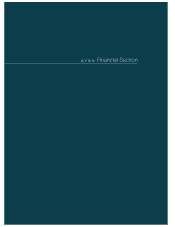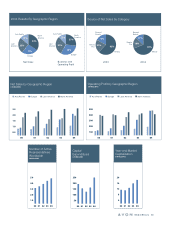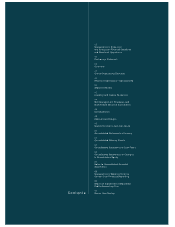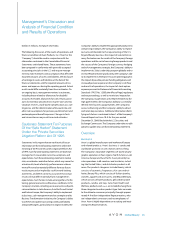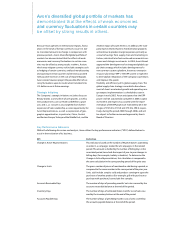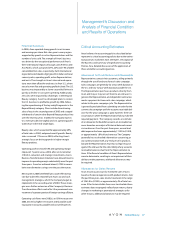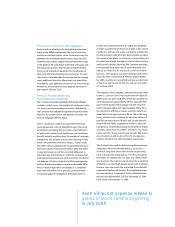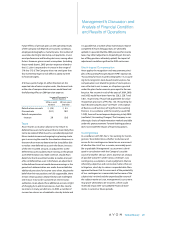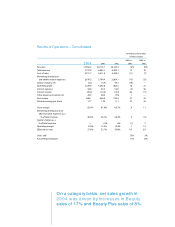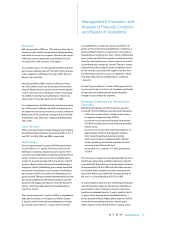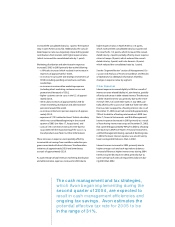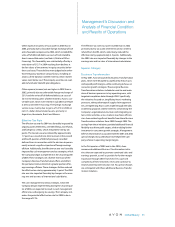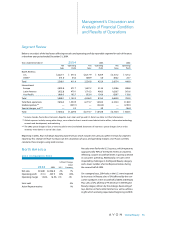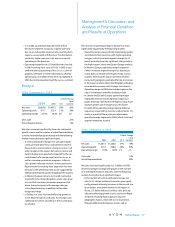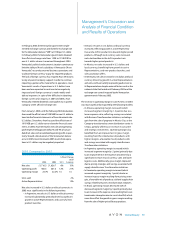Avon 2004 Annual Report Download - page 8
Download and view the complete annual report
Please find page 8 of the 2004 Avon annual report below. You can navigate through the pages in the report by either clicking on the pages listed below, or by using the keyword search tool below to find specific information within the annual report.
Management’s Discussion and
Analysis of Financial Condition
and Results of Operations
Future effects of pension plans on the operating results
of the Company will depend on economic conditions,
employee demographics, mortality rates, the number of
associates electing to take lump-sum payments, invest-
ment performance and funding decisions, among other
factors. However, given current assumptions (including
those noted above), 2005 pension expense related to
the U.S. plan is expected to increase in the range of
$10.0 to $15.0. The Company does not anticipate that
this incremental expense will affect its ability to meet
its financial targets.
A 50 basis point change (in either direction) on the
expected rate of return on plan assets, the discount rate
or the rate of compensation increases would have had
the following effect on 2004 pension expense:
Increase/(Decrease) in
Pension Expense
50 basis point 50 basis point
Increase Decrease
Rate of return on assets $ (4.5) $ 4.5
Discount rate (10.1) 10.9
Rate of compensation
increase 3.9 (3.6)
Taxes
Avon records a valuation allowance to reduce its
deferred tax assets to the amount that is more likely than
not to be realized. While Avon has considered projected
future taxable income and ongoing tax planning strate-
gies in assessing the need for the valuation allowance, in
the event Avon were to determine that it would be able
to realize a net deferred tax asset in the future, in excess
of the net recorded amount, an adjustment to the
deferred tax asset would increase earnings in the period
such determination was made. Likewise, should Avon
determine that it would not be able to realize all or part
of its net deferred tax asset in the future, an adjustment
to the deferred tax asset would decrease earnings in the
period such determination was made. Avon establishes
additional provisions for income taxes when, despite the
belief that their tax positions are fully supportable, there
remain certain positions that are likely to be challenged
and may or may not be sustained on review by tax
authorities. Avon adjusts these additional accruals in light
of changing facts and circumstances. Avon files income
tax returns in many jurisdictions. In 2005, a number of
income tax returns are scheduled to close by statute and
it is possible that a number of tax examinations may be
completed. If Avon’s filing positions are ultimately
upheld, it is possible that the 2005 provision for income
taxes may reflect adjustments. Depending on the num-
ber of filing positions ultimately upheld, the impact of
adjustments could be significant to 2005 net income.
Stock-based Compensation
Avon applies the recognition and measurement princi-
ples of Accounting Principles Board (“APB”) Opinion 25,
“Accounting for Stock Issued to Employees,” in account-
ing for its long-term stock-based incentive plans. No
compensation cost related to grants of stock options
was reflected in net income, as all options granted
under the plans had an exercise price equal to the mar-
ket price. Net income in each of the years of 2004, 2003
and 2002 would have been lower by $26.3, $28.7 and
$30.1, respectively, if Avon had applied the fair value
recognition provisions of FAS No. 123, “Accounting for
Stock-Based Compensation”(see Note 1, Description
of Business and Summary of Significant Accounting
Policies). In accordance with the recently issued FAS
123(R), Avon will record expense beginning in July 2005
(see Note 2, Accounting Changes). The Company is con-
sidering its choice of implementation methods available
under this pronouncement. Forward-looking guidance
does not include the impact of expensing options.
Contingencies
In accordance with FAS No. 5, “Accounting for Contin-
gencies,”Avon determines whether to disclose and
accrue for loss contingencies based on an assessment
of whether the risk of loss is remote, reasonably possi-
ble or probable. Management’s assessment is devel-
oped in consultation with the Company’s outside
counsel and other advisors and is based on an analysis
of possible outcomes under various strategies. Loss
contingency assumptions involve judgments that are
inherently subjective and can involve matters that are
in litigation, which by its nature is unpredictable. Man-
agement believes that its assessment of the probability
of loss contingencies is reasonable, but because of the
subjectivity involved and the unpredictable nature of
the subject matter at issue, management’s assessment
may prove ultimately to be incorrect, which could
materially impact the Consolidated Financial State-
ments in current or future periods.
Global Beauty 29

